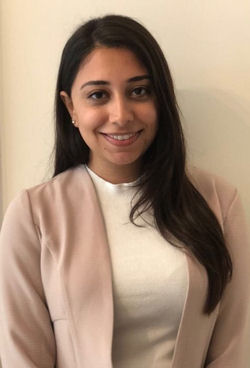My internal medicine clerkship was full of many impactful experiences that shaped how I will move forward in my medical career. It was challenging, exciting, and instructive. I learned how to perform a history and physical examination, build differential diagnoses, and demonstrate professional behavior. However, beyond these important skills, I learned an even more valuable tool for practicing medicine: being confident in myself.
The memory of entering the emergency department and walking toward room 21 with my attending remains as vivid in my mind as if it were yesterday. Mentally, I was preparing to perform a thorough history and physical for the patient. I certainly looked the part of an aspiring doctor as I wore my firmly pressed short white coat with my Littman stethoscope slung around my neck. However, beneath the white coat, I felt my heart pounding and my palms beginning to feel sweaty. As a medical student, having the additional pressure of our attendings closely and keenly observing us can be nerve-racking. It feels as though you are being watched with a microscope and burdened with the fear of making mistakes. Nevertheless, I buried that anguish and proceeded with the task at hand.
We arrived to the room, where we saw a middle-aged man sitting comfortably on a chair next to the hospital bed. He seemed to be in no distress. I started the interview with the standard question of, “What brought you in today?” The patient mentioned that he was just not feeling his usual self and went on to explain that he takes blood pressure medication on a daily basis for hypertension but completely forgot to do so that morning. As he was going about his day, he described that he felt “off,” which prompted him to come to the hospital for further evaluation. The patient had not experienced any vision changes, headaches, or chest pain; all we knew was that he was not feeling well because he did not remember to take his blood pressure medication. The patient had a few physical examination findings, but one significant finding left me astounded and doubtful: a gallop on auscultation of the heart.
First, the attending placed his stethoscope on the patient's chest wall. The attending's eyes widened as though he had heard something, but he did not disclose any information until I listened for myself. I placed my stethoscope on the patient's chest wall and listened closely. I closed my eyes and blocked out the ambient noise of the emergency department, but all I heard were the sounds of a regular, healthy heart. Immediately after, I reported back to the attending what I was able to appreciate on auscultation of the heart by stating these exact words: “I heard S1 and S2 and no rubs, gallops, or murmurs. But what do I know—I'm just a medical student.” The attending reflexively responded, “Hey! Don't say that!” In that moment I felt ashamed, began to question why I had said that, and doubted myself.
Although my interpretation of the heart sounds was incorrect because there was a ventricular gallop, I should have never let the uncertainty overwhelm me. Medical students truly hold a special place in the medical hierarchy. We are called to be driven, valiant, and full of energy. We sometimes feel intimidated by interns, residents, or attendings, who have a vast clinical repertoire of knowledge and are chiseled with experience; however, we should never fall short of our determination to excel. Translating all the late nights that turned into early mornings of our studies into providing care for our patients is a work in progress. It is evident that we as students must engage meaningfully and trust the medical knowledge we have acquired.
We must strive for excellence in the pursuit of transcribing our academic journey into real-world encounters. It is important to remind ourselves that hands-on clinical experience comes with making mistakes but is also for building confidence, more so than any other denominator. This experience was important to me and reminded me that I was not “just” a medical student but a medical student who was passionate and appreciated that I may lack the full set of clinical experiences but that that was okay as long as I never ceased in my pursuit. Meaningful clinical experience comes with time; patience; and, most of all, confidence in all we have learned to date as medical students.

Danielle Labib
American University of Antigua
Class of 2020
Back to the May 2020 issue of ACP IMpact

